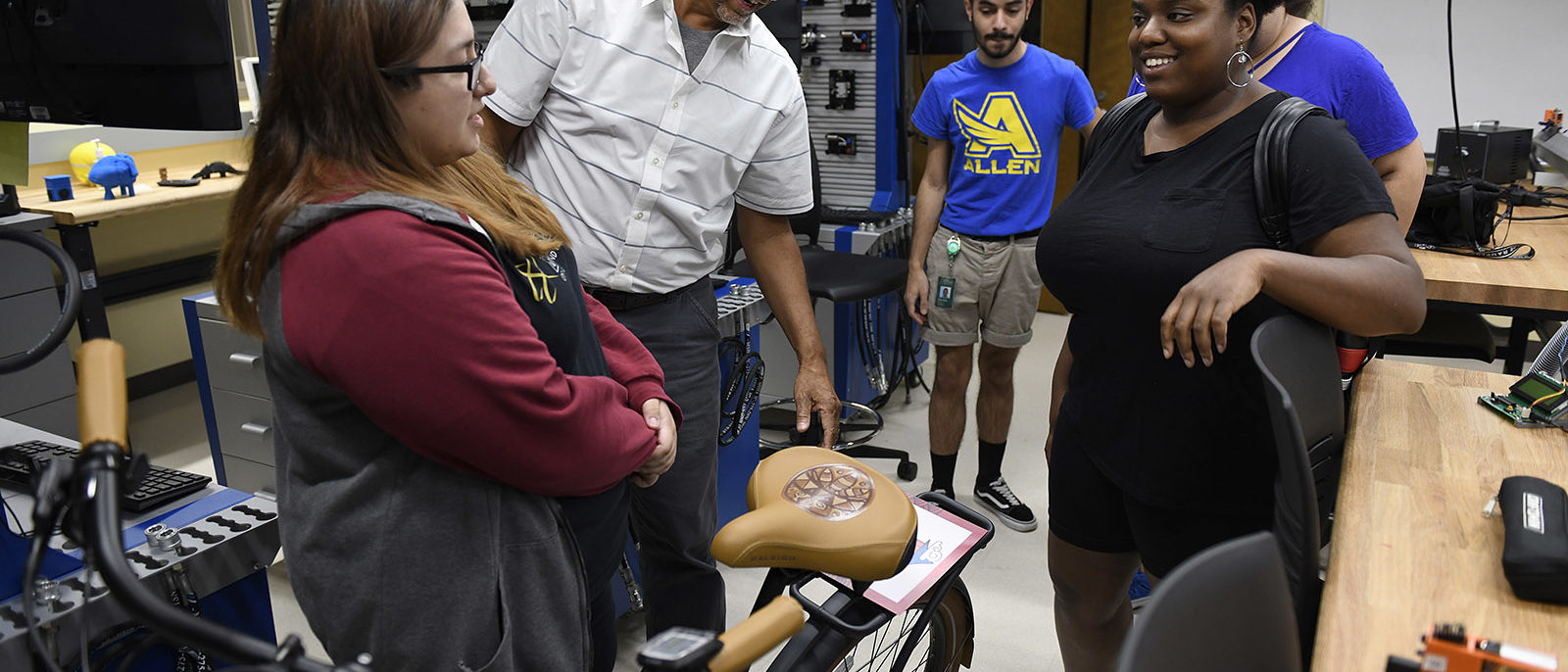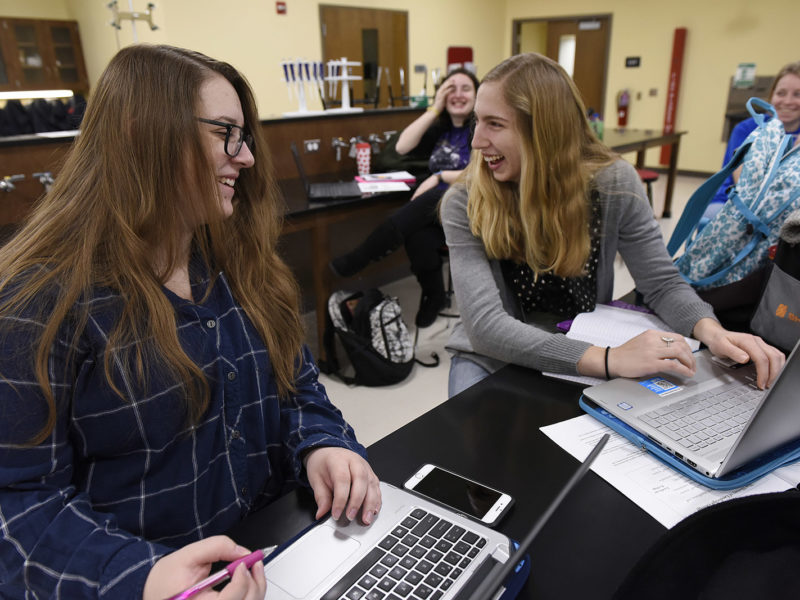Curriculum
The goal of learning at Harrisburg University is for students to obtain the relevant knowledge, competence, and experiences to best be prepared for an enriching career.
We offer a well-rounded education that includes specialized expertise in your field of study, and significant career-oriented components so you graduate with experiences that make you more prepared and competitive in your career and your life.
Our undergraduate curriculum begins with a foundation of general education courses.
This foundation is followed by the development of specialized expertise and experiential components that bring the world of work into your classroom.
Regardless of your major, you graduate with eight core competencies valued by employers and community leaders, plus the skills necessary to enjoy a long-term career. You learn it, you know it, and you get to do it.
Core Competencies
Competency-driven education is a hallmark of the Harrisburg University experience. The student will be expected to demonstrate mastery of eight university-wide competencies. Regardless of the student’s program of study, employers and community leaders desire these competencies. They also prepare students for life and citizenship.
1. Civic engagement
Civic engagement is “working to make a difference in the civic life of our communities and developing the combination of knowledge, skills, values and motivation to make that difference. It means promoting the quality of life in a community through both political and non-political processes.” (Excerpted from Civic Responsibility and Higher Education, edited by Thomas Ehrlich, published by Oryx Press, 2000, Preface, page vi.).
In addition, civic engagement is participation in personal and public activities that are both life enriching and socially beneficial to the community.
2. Written and oral communication
Written communication is the development and expression of ideas in writing. It involves writing in a variety of styles, genres, and technologies and mixing text, data, and images. Written communication abilities develop through repeated writing experiences across the disciplines.
3. Critical thinking
Critical thinking is the use of deliberative thought, characterized by the comprehensive exploration of topics, ideas, artifacts or events before accepting or formulating an opinion or conclusion.
Using reason and experience to form informed judgments, the critical thinker combines or synthesizes existing ideas, images or expertise in original ways; and reacts to experience in imaginative ways, characterized by innovation, divergent thinking, and risk-taking. The critical thinker solves problems by designing, evaluating and implementing a strategy to answer an open-ended question or achieve a desired goal.
Quantitative Literacy (QL) – also known as Numeracy or Quantitative Reasoning (QR) – is a “habit of mind,” competency, and comfort in working with numerical data. Individuals with strong QL skills possess the ability to reason and solve quantitative problems from a wide array of authentic contexts and everyday life situations. They understand and can create sophisticated arguments supported by quantitative evidence and they can clearly communicate those arguments in a variety of formats (using words, tables, graphs, mathematical equations, etc., as appropriate).
4. Entrepreneurship
Entrepreneurship is the process of organizing tangible and intangible resources in order to pursue opportunities that generate value, meet an identified need, or satisfy an organizational or societal market (such as the creation of a business, organization, or laboratory).
At Harrisburg University, entrepreneurship represents a “frame of mind” demonstrated by both thinking and action.
5. Ethical Awareness and reasoning
Ethical decision making actualizes the realization and inclusion of the moral dimension for personal decision-making.
“Reasoning about right and wrong human conduct requires students to be able to 1) assess their own ethical values and the social context of problems, 2) recognize ethical issues in a variety of settings, 3) think about how different ethical perspectives might be applied to ethical dilemmas, and 4) consider the ramifications of alternative actions.” (Source: AAC&U / VALUE rubric)
Ethical self-identity evolves both on individual and organizational (e.g., corporate) levels.
6. Global awareness
Global awareness is knowledge of the world citizenry’s common interests in community, social, political, informational and financial systems of different scales; appreciation and respect for diversity, culture, and environment; and the interactions and impacts of individuals, global systems and cultures.
7. Information literacy
Information literacy encompasses knowledge and familiarity with different media types, efficient data storage, retrieval methods, and research techniques. For the purposes of this rubric, “information” is not only text-based information, but also includes images, sounds, data sets, databases, artifacts, numerical and statistical data.
8. Teamwork and collaboration
Teamwork and Collaboration encompass the ability to work effectively with others in a concerted effort toward a common goal. “Behaviors under the control of individual team members” include efforts put into team tasks, manner of interacting with others on the team, and the quantity and quality of contributions to team discussions. (Source: AAC&U / VALUE rubric)
ePortfolios
Harrisburg University defines an ePortfolio as an organized, media-rich collection of documents that allows the student to demonstrate competence to a multitude of audiences. The ePortfolio will be central in how the student organizes, develops, and reflects upon learning. It will also be a lever for assisting the way in which faculty develop curricula, view teaching, and deliver content.
Ultimately, the ePortfolio will be a coalescing force for making tangible and visible the University-wide competency program while also serving as a key tool in evaluating student success.
Undergraduate Program Structure
Our undergraduate program structure provides students with basic foundation knowledge, program-specific knowledge, opportunities to apply new knowledge, and the flexibility to explore interesting topics. All undergraduate degree programs have the same five structural elements:
- Foundation courses
- General education courses
- Program requirement courses
- Experiential learning
- Electives
The number of semester hours covered by the structural elements adds up to the total of 120 semester hours needed for graduation. Each structural element has specific semester hour and course requirements associated with it. Generally, the breakdown of semester hours by structural element is:
- 18 semester hours in Foundation courses
- 30 semester hours in General Education courses
- 40–50 semester hours in Program Requirement courses
- 13 semester hours in Experiential courses
- 9–19 semester hours in Electives
More information about these elements and their requirements can be found in the course catalog on our Records and Registration page.
© 2024 Harrisburg University of Science and Technology™, All rights reserved. (™) The name Harrisburg University of Science and Technology and all derivatives including emblem and customized font are trademarks pursuant to PA Trademark Act, 54 Pa.C.S.A.:1114.

